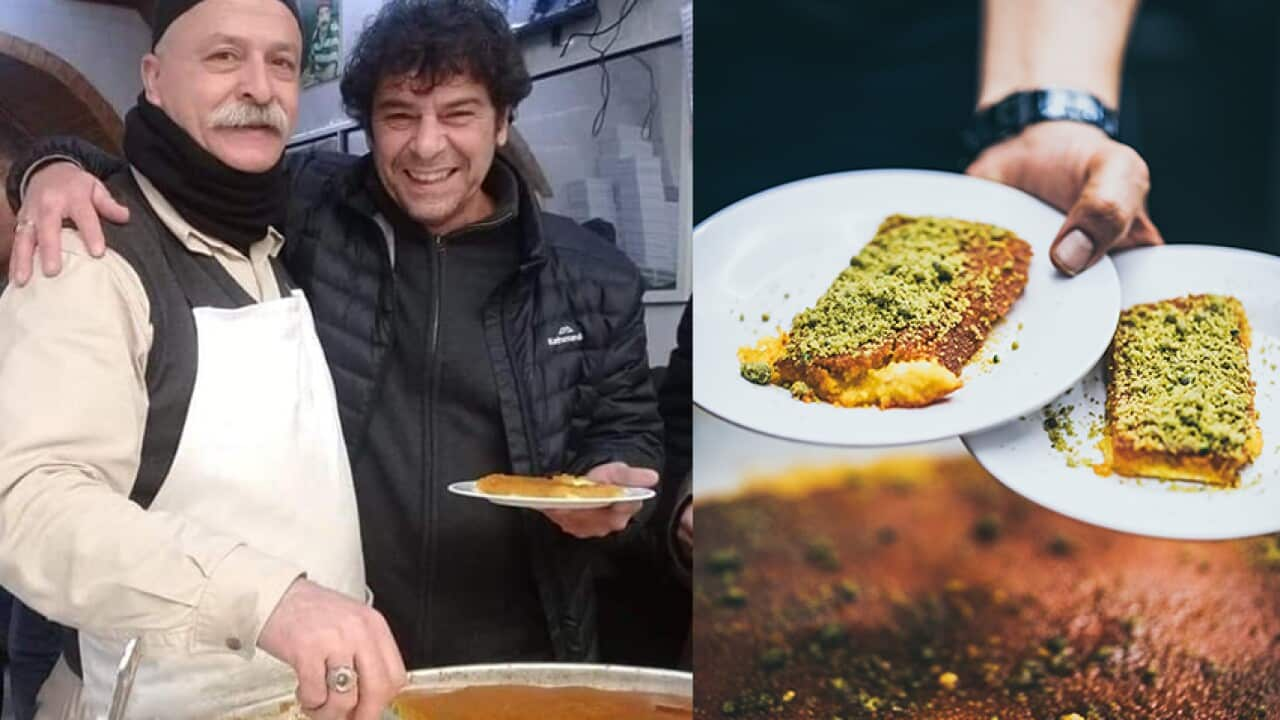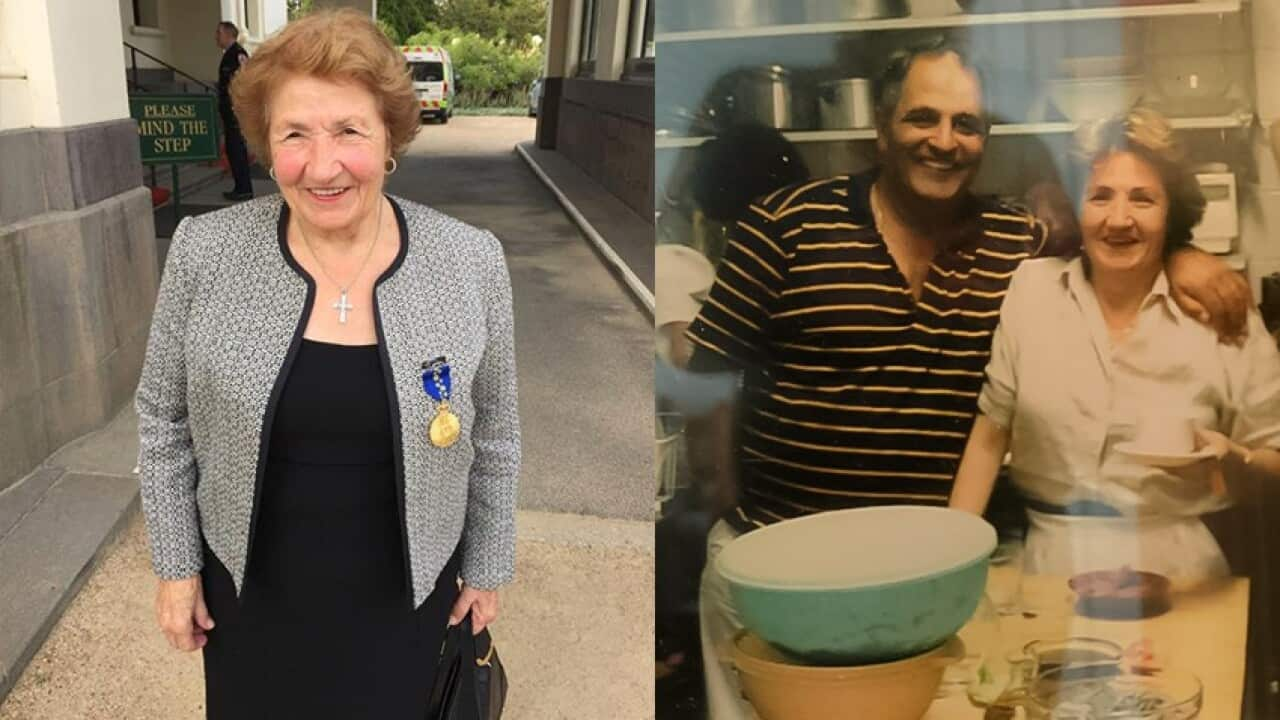A decade ago, Mousa Khayat made the difficult decision to quit his job as a dental lab technician after more than three decades in that industry. He had a clear goal in mind for the future, which was embroiled with his sweet memories of childhood.
"I migrated from my city in Palestine to Melbourne, when I was 24 years old,” he tells SBS Arabic24. “I worked in a glass factory, and then I joined a job in my field as a dental lab technician.”
His dream was to master the cooking of a traditional Palestinian sweet cheese dessert close to his heart - Knafeh Nabulsyeh - the original way, all the way from his home city of Nablus.
Nostalgic beginnings
Mousa recalls that his desire to make and sell the delicacy began to take shape in 1996, 10 years after he migrated to Australia.
“Of course, I was nostalgic for its taste. Back in the olden days in Australia, there were some Arab restaurants, especially Lebanese ones, that served knafeh and various kinds of sweets, but there was no one serving Nablus’ knafeh.
“Nevertheless, the Lebanese community had a humongous contribution in paving the way for many Arab migrants. Whether by opening restaurants or by importing Arabic products, it did help us settle and adapt in Australia.”
The first step towards achieving his dream was to begin making knafeh dough at home, and his three children would watch his passion and dedication grow day after day.
"My father made many machines over the years to prepare the dough,” Mousa’s 24-year-old son Amr says.
“He was trying to design and put together machines using a motor he pulled out from a refrigerator."
His son Nada, 20, says he “felt proud” about what his father was doing.
“He set a goal for himself and made a mighty effort to bring us a piece of our Palestinian heritage to Australia." Amr remembers the day his father came home carrying a tray of knafeh for the family to try.
Amr remembers the day his father came home carrying a tray of knafeh for the family to try.

Mousa Khayat preparing knafeh at his Melbourne resturant using a machine he created. Source: Supplied
“It was the first time that I and my siblings had eaten it.
"We went crazy. We did not believe how delicious it was, and we started asking him to make more and more every day.”
For the Khayat family, knafeh from Nablus is not only a sweet with historical signficance but a symbol of Palestinian culture that links them to their ancestors and origins.
"When people ask me about it, I tell them that it’s a taste of history,” Mousa says.

Mousa Khayat's family member at the shop Knafeh Nabulseyeh in Melbourne. Source: Knafeh Nabulseyeh
'Go, you are ready'
Before he could move to the next phase of his dream open his own restaurant, Mousa visited Nablus to absorb all that he could about the traditional methods of cooking the delicacy from those who made it for centuries.
"I stayed there for over a month. When they felt that I learned what I needed, they told me, 'Go, you are ready."
Indeed, he was. When he got back to Melbourne, he started designing machines to help the process of preparation, with the help of several engineers.
"There is more than one type of machine, one for preparing the hairy dough, another for the soft dough, one for frying and the other for sifting.” He prepares the dish with special ghee and then mixes a number of cheeses and other dairy products for the filling.
He prepares the dish with special ghee and then mixes a number of cheeses and other dairy products for the filling.

One of Nablus's knafeh masters with Mousa Khayat in Nablus. Source: Mousa Al Khayat
He even goes to the effort of importing ingredients from Nablus, as they are not available in Australia.
Finally, in 2015, Mousa fulfilled his dream of opening his restaurant, Knafeh Nabulsyeh, in a south-eastern Melbourne suburb of Hughesdale.
One of the interior walls of the establishment depicts a scene from a picture taken of Al-Nasr Street in Nablus, which he says documents a happy memory from his childhood of eating knafeh. He says the restaurant relies entirely on walk-in customers and word of mouth. However, within a short period of time, it has gained popularity due to the sweet.
He says the restaurant relies entirely on walk-in customers and word of mouth. However, within a short period of time, it has gained popularity due to the sweet.

Mousa Khayat at his shop Knafeh Nabulseyeh. The wall directly behind Mousa is dedicated to his home city. Source: Mousa Al Khayat
“So many people praised us for the family effort. We please our first-timers and migrants who are looking to have a piece of our knafeh to bring back their sweet memories.
“I will not forget when an elderly man visited me, my God have mercy on his soul as he passed away. He said to me, ‘I wanted to eat a piece of Knafeh Nabulsyeh before I die’.”
Passing the torch
Mousa’s children intend on passing the special recipe onto the next generation in Australia, in honour of their father's efforts and pride in their Palestinian culture.
“This restaurant is a place not just for ‘the Khayat family’. It’s a place for everyone who wants to try the knafeh for the first time or come back and eat it,” Amr says.
“It’s a place where they can sit down and enjoy a Palestinian kind of atmosphere, music-wise, taste-wise, and smell-wise. Those attributes are all the attributes that can create memories. And if you can just bring those memories back to someone, that’s a gift that not many people can give.”
A new episode of BaSSamat will be available every Tuesday on your , or you can listen through the SBS Arabic24 website .






